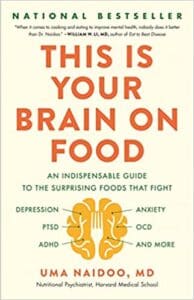NPFY Book Review: This is Your Brain on Food
In her book, This is Your Brain on Food, Dr. Uma Naidoo explores the relationship between food, the gut microbiome and the brain. Naidoo stresses the importance of a balanced, nutritious diet as a supplement to healthy living. This book is organized in chapters relating to common health challenges, like depression or insomnia, and provides a guide to eating that can help remedy the issue.
Naidoo explores how foods like salmon, carrots and brazil nuts can help with depression, and the overall negative impact the Western Diet has on mental and physical health. She also stated that coffee can increase anxiety and worsen insomnia, causing some of the NPFY office to start limiting coffee or switch to tea. Implementing spices like turmeric and saffron, accompanied by black pepper, can also help with depression, heart disease and cancer. Overall, Naidoo discussed how eating more plant based foods, healthy proteins and healthy fats can help with a variety of physical and mental ailments
However, it’s important to note that the foods and diets suggested in this book aren’t a cure-all. The patients who saw results simply used foods as a supplement along with necessary medication, therapy, exercise and other treatments. Not to mention that food deserts across America pose challenges to accessing affordable, fresh produce. When dealing with food insecurity, choosing the most filling, calorically dense food is one of the only options to getting through the day. For this reason, villainizing the western diet or any diet isn’t productive, rather choosing the most nutritious option when possible is more beneficial.
Balance is important to creating longevity in dietary changes, and Dr. Naidoo doesn’t suggest that readers cut out “unhealthy” foods entirely. Complete restriction causes risk of short lasting positive results that can be negated through bingeing, or quitting due to damaging limitations. For example, if Chick-Fil-A is a diet staple, Dr. Naidoo suggests getting the grilled nuggets instead of the fried and replacing fries with a fruit cup, or even practicing moderation. The book also offers a variety of recipes for each health issue that can aid in creating a sound diet.
The NPFY office gave mixed reviews on the book, but everyone had at least one try on experience. For example, some started adding turmeric to their brown rice, using cauliflower instead of rice or started drinking chamomile tea before bed for a better nights sleep.
Visit Nourish Phoenix for more resources on access to nutritious foods, meals, clothing and more.
